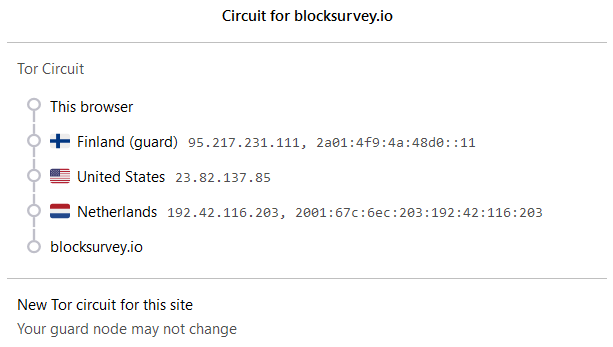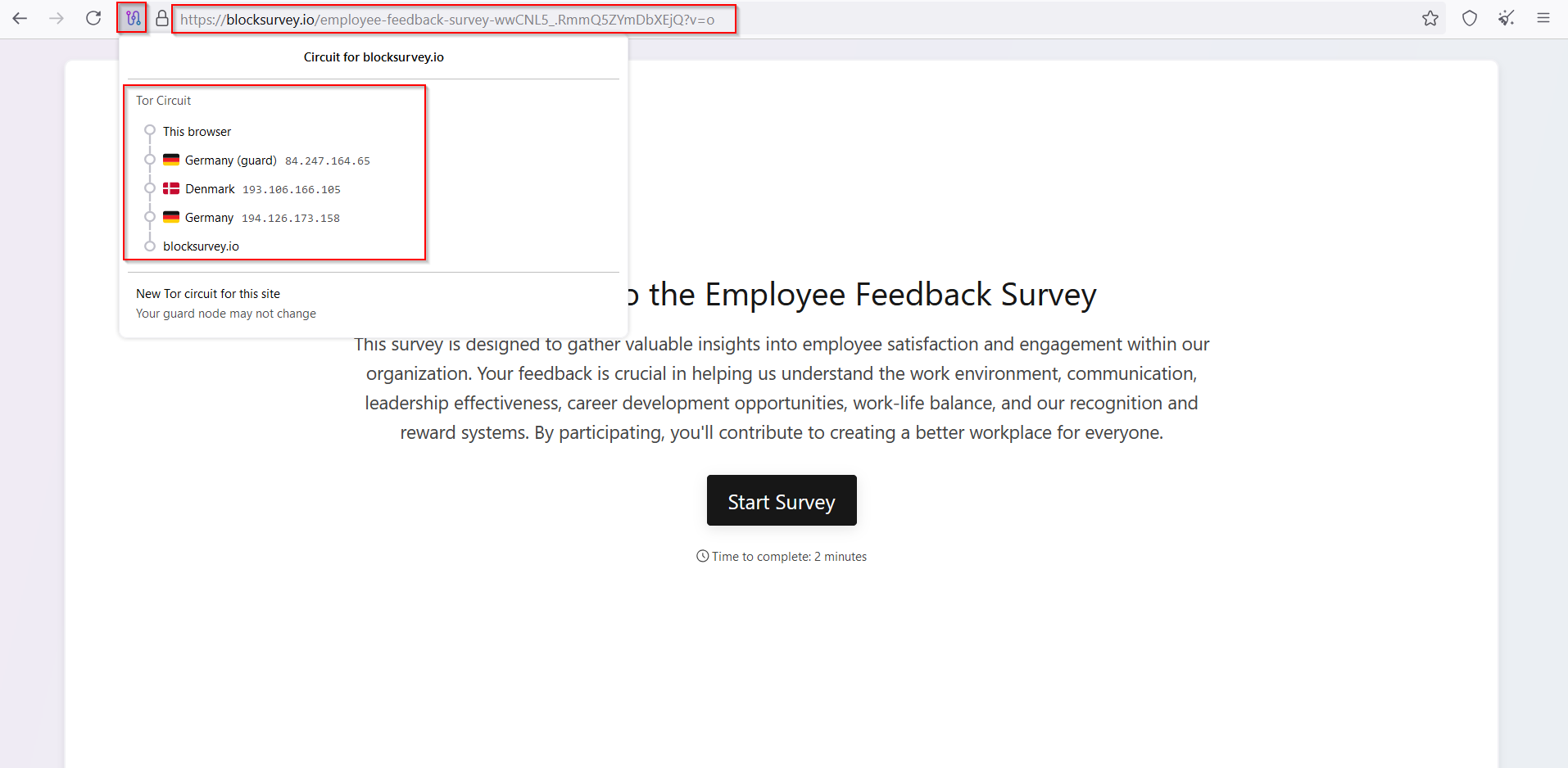Get insights.
Unlock value.
- 14-day free trial
- Set up in minutes
- No credit card required
How to make surveys accessible on the Dark Web with Onion Routing in BlockSurvey
Imagine taking a survey without leaving a digital trace— no IP address. Is this possible?
In today’s privacy-conscious world, users are looking for ways to protect their personal information and maintain online anonymity. For survey participants, especially when sharing sensitive information, knowing their data cannot be traced back to them is a major benefit. That’s where Onion Routing comes in. But what exactly is Onion Routing, and how does it work in BlockSurvey?
What is Onion Routing?
Onion Routing is a privacy-focused networking technique. Simply, it encrypts data multiple times before it’s sent, creating layers (like an onion) that mask the sender’s identity as the data moves across various servers.
When accessing content through the Tor browser, the user's requests are routed through several nodes or relays, each adding a layer of encryption, effectively hiding the IP address. This method enables secure, anonymous communication over the Internet, ideal for those prioritizing privacy.
How Does Onion Routing Work?
When a user accesses a link in the Tor browser (short for The Onion Router), the data doesn’t follow a direct path. Instead, it travels through a Tor circuit, which consists of a series of random relays (or nodes) across the network, each applying a layer of encryption. Here’s how it works:
- Entry Node: The first node in the circuit, which knows the user’s IP address but doesn’t have visibility into the data’s final destination.
- Middle Node(s): These intermediary nodes form additional layers, further scrambling the path, and ensuring that no single node can view both the sender and recipient of the data.
- Exit Node: The last node in the circuit, which removes the final layer of encryption and sends the data to its destination without revealing the original IP address.
Because each node only knows its immediate source and destination, this Tor circuit structure provides strong anonymity. Additionally, the circuit periodically changes, creating a fresh path and further strengthening privacy protection.

Benefits of Using Onion Routing in Surveys:
With privacy and security at the forefront, Onion Routing offers a host of benefits:
- Complete Anonymity: Respondents can participate in surveys without worrying about their IP address being tracked.
- Data Security: The multi-layer encryption ensures data remains secure and untraceable.
- Increased Trust: By prioritizing respondents' privacy, you encourage honest and more accurate feedback.
How is Onion Routing Implemented in BlockSurvey?
In BlockSurvey, users benefit from Onion Routing with ease. Unlike traditional survey platforms, BlockSurvey doesn’t require a unique onion URL. When respondents open the survey link in the Tor browser, the Onion Routing protection automatically kicks in, encrypting their data across multiple nodes and ensuring their IP address is untraceable. This setup reflects BlockSurvey’s commitment to privacy, allowing anonymous survey submissions without extra steps.

Use Cases for Onion Routing in Surveys
If you are running any sensitive surveys, if you feel your audience needs complete anonymity, encourage them to take surveys through the Tor browser. By default, BlockSurvey will give them anonymity. Below are some use cases you can consider for Onion Routing.
- Confidential Employee Feedback: Organizations can use onion routing to collect honest and unfiltered feedback from employees. Whether it's about workplace satisfaction, reporting unethical behavior, or suggestions for improvement, anonymity ensures employees can share without fear of repercussions.
- Benefit: Fosters a transparent work environment and helps management identify and address issues promptly.
- Healthcare and Mental Health Assessments: Medical institutions and researchers can conduct surveys on sensitive health topics, such as mental health, addiction, or chronic illnesses, where respondents may prefer to remain anonymous.
- Benefit: Encourages participation from individuals who might otherwise hesitate to share personal health information.
- Political and Social Opinion Polls & Surveys: In regions with political unrest or strict censorship, onion routing allows citizens to express their opinions on government policies, social issues, or elections without risking their safety.
- Benefit: Provides researchers and organizations with authentic data while protecting respondents from potential backlash.
- Academic Research and Studies: Researchers conducting studies on controversial or stigmatized topics can use onion routing to ensure participant anonymity, leading to more accurate and honest responses.
- Benefit: Enhances the quality of research data and protects participant identity.
- NGO and Activist Group Outreach: Non-governmental organizations and activist groups working on sensitive issues like human rights, whistleblowing, or corruption can use onion routing to collect information from individuals in high-risk environments.
- Benefit: Safeguards informants and participants, making it easier to gather critical data for advocacy.
- Consumer Privacy in Market Research: Companies can conduct market research on new products or services while respecting consumer privacy, especially in industries dealing with personal or financial information.
- Benefit: Builds trust with consumers and increases participation rates.
Conclusion
Onion Routing opens up new possibilities for survey participants seeking complete anonymity. With this feature in BlockSurvey, users can be assured that their IP addresses are untraceable, allowing them to share information freely and securely. As privacy and data protection become top priorities, BlockSurvey’s Onion Routing feature stands out as a tool for secure, anonymous participation. Give it a try! And let your respondents experience a new standard of privacy.
Get insights.
Unlock value.
- 14-day free trial
- Set up in minutes
- No credit card required





